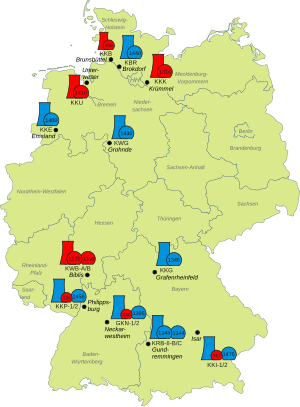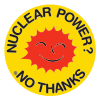

| Anti-nuclear movement |
|---|
 |
| By country |
| Lists |
The anti-nuclear movement in Germany has a long history dating back to the early 1970s when large demonstrations prevented the construction of a nuclear plant at Wyhl. The Wyhl protests were an example of a local community challenging the nuclear industry through a strategy of direct action and civil disobedience. Police were accused of using unnecessarily violent means. Anti-nuclear success at Wyhl inspired nuclear opposition throughout West Germany, in other parts of Europe, and in North America. A few years later protests raised against the NATO Double-Track Decision in West Germany and were followed by the foundation of the Green party.
In 1986, large parts of Germany were covered with radioactive contamination from the Chernobyl disaster and Germans went to great lengths to deal with the contamination. Germany's anti-nuclear stance was strengthened. From the mid-1990s onwards, anti-nuclear protests were primarily directed against transports of radioactive waste in "CASTOR" containers.
In September 2010, German government policy shifted back toward nuclear energy, and this generated some new anti-nuclear sentiment in Berlin and beyond. On 18 September 2010, tens of thousands of Germans surrounded Chancellor Angela Merkel's office. In October 2010, tens of thousands of people protested in Munich. In November 2010, there were violent protests against a train carrying reprocessed nuclear waste.
Within days of the March 2011 Fukushima Daiichi nuclear disaster, large anti-nuclear protests occurred in Germany. Chancellor Angela Merkel promptly "imposed a three-month moratorium on previously announced extensions for Germany's existing nuclear power plants, while shutting seven of the 17 reactors that had been operating since 1981". Protests continued and, on 29 May 2011, Merkel's government announced that it would close all of its nuclear power plants by 2022.[2][3] Galvanised by the Fukushima nuclear disaster, first anniversary anti-nuclear demonstrations were held in Germany in March 2012. Organisers say more than 50,000 people in six regions took part.[4]
In April 2023, the last of Germany's nuclear power plants ceased operation. Critics have commented that these closures have resulted in Germany becoming largely reliant on fossil fuels for the majority of its energy production, predominantly coal mined within Germany, and imported natural gas mainly from Russia.[5][6][7]
- ^ IAEA (2011). "Power Reactor Information System". iaea.org. Archived from the original on 2012-02-11. Retrieved 2013-10-11.
- ^ Caroline Jorant (July 2011). "The implications of Fukushima: The European perspective". Bulletin of the Atomic Scientists. 67 (4): 15. doi:10.1177/0096340211414842. S2CID 144198768. Archived from the original on 2020-05-15. Retrieved 2011-07-02.
- ^ Cite error: The named reference
dw31511was invoked but never defined (see the help page). - ^ "Anti-nuclear demos across Europe on Fukushima anniversary". Euronews. 11 March 2011. Archived from the original on 15 April 2012. Retrieved 14 March 2012.
- ^ "German government rejects new call to delay nuclear shutdown". AP NEWS. 2023-04-12. Retrieved 2023-06-05.
- ^ Connolly, Kate (2022-07-08). "Germany to reactivate coal power plants as Russia curbs gas flow". The Guardian. ISSN 0261-3077. Retrieved 2023-06-05.
- ^ Jordans, Frank (2023-04-15). "Over and out: Germany switches off its last nuclear plants". ABC News. Retrieved 2023-06-06.